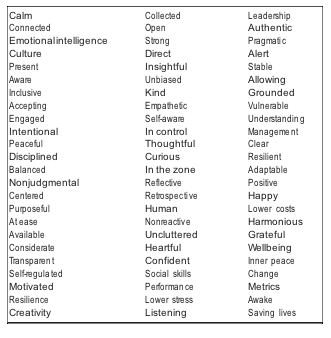I travel the world training leaders on mindfulness and emotional intelligence skills. As more organizations move to flatter org charts and employees who share more information instantaneously, every employee is a “leader” in some way.
When I survey professionals on the question “What does mindfulness mean to you?” the list is inspiring and routinely includes the following:
I was recently training 75 executives in New York City, hosted at J. Walter Thompson’s global headquarters. We had a running list of 40 to 50 items. We ended when a doctor attending the training yelled out, “Saving Lives.” This is what mindfulness meant to her. She went on to explain to the audience, “Hospital shifts can mean 14-hour days. Doctors and nurses suffer from illness and injury at a rate 30% higher than the next closest industry—manufacturing. We serve patients who wait too long to address serious health issues. By the time they come to us, they’re unwilling and unable to participate in their own recovery. Without the right training, compassion fatigue takes years off the average healthcare worker’s life.”
She had tears in her eyes and thunder in her voice. It was a drop-the-mic moment. It was touching, real, and everything else on the list felt cute in comparison. I couldn’t have agreed more. We all need this in our lives. And mindfulness is about saving lives. Starting with your own. I’ve borrowed that sentiment in every live training since then.
This is a powerful list and another reason that employees, leaders and companies of all sizes are so interested in bringing mindfulness and emotional intelligence skills into their culture. Take a look at the list again. Regardless of your level, imagine the kind of leader you can be (at work and home), and the kind of life you can enjoy, with more of this in your personal arsenal.
Let’s pause, take a breath, and set that intention. This is happening.












